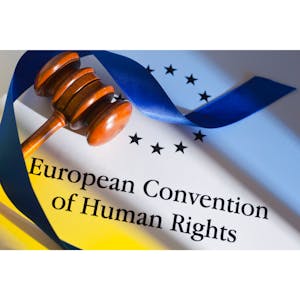Delve into the intricate human rights systems with Human Rights for Open Societies. This course sheds light on the European Convention on Human Rights (ECHR) and its pivotal role in safeguarding fundamental freedoms. From the foundations of the ECHR to the protection of vulnerable groups, migrants, and asylum seekers, this comprehensive program provides a deep understanding of human rights in practice.
Embark on a journey of discovery into the ECHR, exploring its linkages to open societies and the principles of interpretation. Gain insights into the protection of human rights in democratic societies, the rights of migrants and asylum seekers, and the nuances of freedom of expression and public protest. Engage with real-world cases and practical exercises to grasp the complexities of human rights dilemmas today.
Certificate Available ✔
Get Started / More Info
Human Rights for Open Societies comprises six modules that delve into the complexities of the European Convention on Human Rights. From the foundational aspects of the ECHR to the protection of vulnerable groups, migrants, and asylum seekers, this course offers a comprehensive understanding of human rights in practice.
Module 1 provides a comprehensive introduction to the European Convention on Human Rights, exploring its foundations, admissibility requirements, and the procedures in Strasbourg. Gain insights into the linkages between the ECHR and open societies, as well as an in-depth understanding of where to find rights in the ECHR.
Module 2 delves into the general principles of the ECHR, covering the methods of interpretation, categories of rights, conditions for restriction, and the intensity of review of restrictions. Engage with practical exercises to comprehend the justification of restrictions and the impact of the margin of appreciation in concrete cases.
Module 3 focuses on the intersection of human rights and democracy, examining the protection of human rights in democratic societies, the rights of political parties, transitions to democracy, and the right to vote and stand for election. Additionally, explore the freedom of assembly and association, particularly in the context of voting rights for people with mental disabilities.
Module 4 delves into non-discrimination, vulnerable groups, migrants, and asylum seekers, emphasizing the universal protection of human rights, non-discrimination, and the rights of migrants and asylum seekers under the ECHR. Engage with practical exercises to understand the prohibition of discrimination and the protection of vulnerable groups.
Module 5 explores freedom of expression and public protest, analyzing the role of the media, the freedom of public protest, and the criteria for the protection of the media. Gain insights into the importance of freedom of expression in the political arena and the ECHR criteria for freedom of expression for politicians.
Module 6 serves as a closure to the course, summarizing the key learnings and insights gained from the exploration of the European Convention on Human Rights and its role in protecting fundamental freedoms in open societies.
Privacy and Standardisation is a comprehensive study of privacy rights, data protection, and standardization in a technological context. This course provides a historical...
Corporate governance. Mitos y realidades provides a comprehensive exploration of corporate governance, encompassing legal and economic perspectives. It delves into...
This course provides an in-depth exploration of intellectual property, covering patents, trademarks, and copyrights, and their impact on business and innovation....
Introducción al Derecho Internacional Público is a comprehensive course that delves into the intricacies of international law, treaties, diplomacy, and organizational...